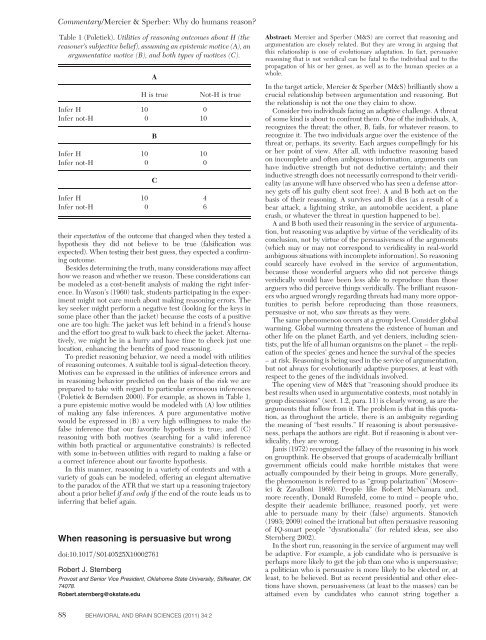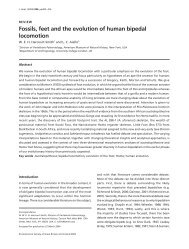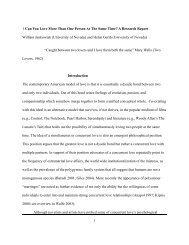Commentary/Mercier & Sperber: <strong>Why</strong> <strong>do</strong> <strong>hum<strong>an</strong>s</strong> <strong>reason</strong>?Table 1 (Poletiek). Utilities of <strong>reason</strong>ing outcomes about H (the<strong>reason</strong>er’s subjective belief), assuming <strong>an</strong> epistemic motive (A), <strong>an</strong><strong>argumentative</strong> motive (B), <strong>an</strong>d both types of motives (C).their expectation of the outcome that ch<strong>an</strong>ged when they tested ahypothesis they did not believe to be true (falsification wasexpected). When testing their best guess, they expected a confirmingoutcome.Besides determining the truth, m<strong>an</strong>y considerations may affecthow we <strong>reason</strong> <strong>an</strong>d whether we <strong>reason</strong>. These considerations c<strong>an</strong>be modeled as a cost-benefit <strong>an</strong>alysis of making the right inference.In Wason’s (1960) task, students participating in the experimentmight not care much about making <strong>reason</strong>ing errors. Thekey seeker might per<strong>for</strong>m a negative test (looking <strong>for</strong> the keys insome place other th<strong>an</strong> the jacket) because the costs of a positiveone are too high: The jacket was left behind in a friend’s house<strong>an</strong>d the ef<strong>for</strong>t too great to walk back to check the jacket. Alternatively,we might be in a hurry <strong>an</strong>d have time to check just onelocation, enh<strong>an</strong>cing the benefits of good <strong>reason</strong>ing.To predict <strong>reason</strong>ing behavior, we need a model with utilitiesof <strong>reason</strong>ing outcomes. A suitable tool is signal-detection <strong>theory</strong>.Motives c<strong>an</strong> be expressed in the utilities of inference errors <strong>an</strong>din <strong>reason</strong>ing behavior predicted on the basis of the risk we areprepared to take with regard to particular erroneous inferences(Poletiek & Berndsen 2000). For example, as shown in Table 1,a pure epistemic motive would be modeled with (A) low utilitiesof making <strong>an</strong>y false inferences. A pure <strong>argumentative</strong> motivewould be expressed in (B) a very high willingness to make thefalse inference that our favorite hypothesis is true; <strong>an</strong>d (C)<strong>reason</strong>ing with both motives (searching <strong>for</strong> a valid inferencewithin both practical or <strong>argumentative</strong> constraints) is reflectedwith some in-between utilities with regard to making a false ora correct inference about our favorite hypothesis.In this m<strong>an</strong>ner, <strong>reason</strong>ing in a variety of contexts <strong>an</strong>d with avariety of goals c<strong>an</strong> be modeled, offering <strong>an</strong> eleg<strong>an</strong>t alternativeto the para<strong>do</strong>x of the ATR that we start up a <strong>reason</strong>ing trajectoryabout a prior belief if <strong>an</strong>d only if the end of the route leads us toinferring that belief again.When <strong>reason</strong>ing is persuasive but wrong<strong>do</strong>i:10.1017/S0140525X10002761Robert J. SternbergAH is trueInfer H 10 0Infer not-H 0 10Infer H 10 10Infer not-H 0 0Infer H 10 4Infer not-H 0 6BCNot-H is trueProvost <strong>an</strong>d Senior Vice President, Oklahoma State University, Stillwater, OK74078.Robert.sternberg@okstate.eduAbstract: Mercier <strong>an</strong>d Sperber (M&S) are correct that <strong>reason</strong>ing <strong>an</strong>dargumentation are closely related. But they are wrong in arguing thatthis relationship is one of evolutionary adaptation. In fact, persuasive<strong>reason</strong>ing that is not veridical c<strong>an</strong> be fatal to the individual <strong>an</strong>d to thepropagation of his or her genes, as well as to the hum<strong>an</strong> species as awhole.In the target article, Mercier & Sperber (M&S) brilli<strong>an</strong>tly show acrucial relationship between argumentation <strong>an</strong>d <strong>reason</strong>ing. Butthe relationship is not the one they claim to show.Consider two individuals facing <strong>an</strong> adaptive challenge. A threatof some kind is about to confront them. One of the individuals, A,recognizes the threat; the other, B, fails, <strong>for</strong> whatever <strong>reason</strong>, torecognize it. The two individuals argue over the existence of thethreat or, perhaps, its severity. Each argues compellingly <strong>for</strong> hisor her point of view. After all, with inductive <strong>reason</strong>ing base<strong>do</strong>n incomplete <strong>an</strong>d often ambiguous in<strong>for</strong>mation, arguments c<strong>an</strong>have inductive strength but not deductive certainty; <strong>an</strong>d theirinductive strength <strong>do</strong>es not necessarily correspond to their veridicality(as <strong>an</strong>yone will have observed who has seen a defense attorneygets off his guilty client scot free). A <strong>an</strong>d B both act on thebasis of their <strong>reason</strong>ing. A survives <strong>an</strong>d B dies (as a result of abear attack, a lightning strike, <strong>an</strong> automobile accident, a pl<strong>an</strong>ecrash, or whatever the threat in question happened to be).A <strong>an</strong>d B both used their <strong>reason</strong>ing in the service of argumentation,but <strong>reason</strong>ing was adaptive by virtue of the veridicality of itsconclusion, not by virtue of the persuasiveness of the arguments(which may or may not correspond to veridicality in real-worldambiguous situations with incomplete in<strong>for</strong>mation). So <strong>reason</strong>ingcould scarcely have evolved in the service of argumentation,because those wonderful arguers who did not perceive thingsveridically would have been less able to reproduce th<strong>an</strong> thosearguers who did perceive things veridically. The brilli<strong>an</strong>t <strong>reason</strong>erswho argued wrongly regarding threats had m<strong>an</strong>y more opportunitiesto perish be<strong>for</strong>e reproducing th<strong>an</strong> those <strong>reason</strong>ers,persuasive or not, who saw threats as they were.The same phenomenon occurs at a group level. Consider globalwarming. Global warming threatens the existence of hum<strong>an</strong> <strong>an</strong><strong>do</strong>ther life on the pl<strong>an</strong>et Earth, <strong>an</strong>d yet deniers, including scientists,put the life of all hum<strong>an</strong> org<strong>an</strong>isms on the pl<strong>an</strong>et – the replicationof the species’ genes <strong>an</strong>d hence the survival of the species– at risk. Reasoning is being used in the service of argumentation,but not always <strong>for</strong> evolutionarily adaptive purposes, at least withrespect to the genes of the individuals involved.The opening view of M&S that “<strong>reason</strong>ing should produce itsbest results when used in <strong>argumentative</strong> contexts, most notably ingroup discussions” (sect. 1.2, para. 11) is clearly wrong, as are thearguments that follow from it. The problem is that in this quotation,as throughout the article, there is <strong>an</strong> ambiguity regardingthe me<strong>an</strong>ing of “best results.” If <strong>reason</strong>ing is about persuasiveness,perhaps the authors are right. But if <strong>reason</strong>ing is about veridicality,they are wrong.J<strong>an</strong>is (1972) recognized the fallacy of the <strong>reason</strong>ing in his workon groupthink. He observed that groups of academically brilli<strong>an</strong>tgovernment officials could make horrible mistakes that wereactually compounded by their being in groups. More generally,the phenomenon is referred to as “group polarization” (Moscovici& Zavalloni 1969). People like Robert McNamara <strong>an</strong>d,more recently, Donald Rumsfeld, come to mind – people who,despite their academic brilli<strong>an</strong>ce, <strong>reason</strong>ed poorly, yet wereable to persuade m<strong>an</strong>y by their (false) arguments. St<strong>an</strong>ovich(1993; 2009) coined the irrational but often persuasive <strong>reason</strong>ingof IQ-smart people “dysrationalia” (<strong>for</strong> related ideas, see alsoSternberg 2002).In the short run, <strong>reason</strong>ing in the service of argument may wellbe adaptive. For example, a job c<strong>an</strong>didate who is persuasive isperhaps more likely to get the job th<strong>an</strong> one who is unpersuasive;a politici<strong>an</strong> who is persuasive is more likely to be elected or, atleast, to be believed. But as recent presidential <strong>an</strong>d other electionshave shown, persuasiveness (at least to the masses) c<strong>an</strong> beattained even by c<strong>an</strong>didates who c<strong>an</strong>not string together a88 BEHAVIORAL AND BRAIN SCIENCES (2011) 34:2
Commentary/Mercier & Sperber: <strong>Why</strong> <strong>do</strong> <strong>hum<strong>an</strong>s</strong> <strong>reason</strong>?coherent sentence. In the long run, the arguments of demagogicpolitici<strong>an</strong>s are likely to lead to chaos. In the same way, the argumentsof unscrupulous but persuasive clergymen are leading toterrorist attacks today.If, as the authors argue, “the main function of <strong>reason</strong>ing is toproduce arguments to convince others rather th<strong>an</strong> to find thebest decision” (sect. 1.2, para. 11), then hum<strong>an</strong> survival is inserious jeopardy. In today’s world, <strong>reason</strong>ing very likely isbeing used primarily to convince others rather th<strong>an</strong> to find thebest decision, but this use of <strong>reason</strong>ing is not evolutionarily adaptive<strong>for</strong> survival in the long run.Perhaps, as a society, we are placing too much emphasis on<strong>reason</strong>ing in the service of argumentation, whether it is oncollege applications, in job interviews, or in elections. Instead,our society should place more emphasis on wis<strong>do</strong>m, the directionof <strong>reason</strong>ing (<strong>an</strong>d other skills) toward a common good, over thelong as well as the short term, through the infusion of positiveethical values (Sternberg et al. 2007). In a microcosm, thetarget article represents what has gone wrong with society as awhole: Society has come to care more about <strong>reason</strong>ing in theservice of persuasion th<strong>an</strong> <strong>reason</strong>ing in the service of truth oreven some kind of ethical good. This trend risks leading not tobetter adaptation of <strong>hum<strong>an</strong>s</strong> but, rather, to their ultimatedestruction.The chronometrics of confirmation bias:Evidence <strong>for</strong> the inhibition of intuitivejudgements<strong>do</strong>i:10.1017/S0140525X10002876Edward J. N. Stupple a <strong>an</strong>d Linden J. Ball ba Centre <strong>for</strong> Psychological Research, University of Derby, Derby DE22 1GB,United King<strong>do</strong>m; b Department of Psychology, L<strong>an</strong>caster University, L<strong>an</strong>casterLA1 4YF, United King<strong>do</strong>m.e.j.n.stupple@derby.ac.uk l.ball@l<strong>an</strong>caster.ac.ukhttp://psychology.derby.ac.uk/staff/Ed_Stupple.htmlhttp://www.psych.l<strong>an</strong>cs.ac.uk/people/LindenBall.htmlAbstract: Mercier & Sperber (M&S) claim that the phenomenon ofbelief bias – which they consider to be <strong>an</strong> archetypal m<strong>an</strong>ifestation of ageneral confirmation bias in hum<strong>an</strong> <strong>reason</strong>ing – provides fundamentalsupport <strong>for</strong> their <strong>argumentative</strong> <strong>theory</strong> <strong>an</strong>d its basis in intuitivejudgement. We propose that chronometric evidence necessitates amore nu<strong>an</strong>ced account of belief bias that is not readily captured by<strong>argumentative</strong> <strong>theory</strong>.Mercier & Sperber’s (M&S’s) impressive <strong>argumentative</strong> <strong>theory</strong>reassesses the function of <strong>reason</strong>ing, not as involving the noblepursuit of truth, but instead as a Machiavelli<strong>an</strong> communicativeart with persuasion <strong>an</strong>d self-interest at its core. A case in pointis the infamous confirmation bias, whereby individuals seemmotivated to seek confirmatory evidence <strong>for</strong> their existingbeliefs <strong>an</strong>d hypotheses <strong>an</strong>d fail to look <strong>for</strong> counterevidence orcounterarguments (Nickerson 1998). M&S claim that a quintessentialdemonstration of confirmation bias that supports their<strong>theory</strong> c<strong>an</strong> be seen in the phenomenon of belief bias, wheresome contemporary theories suggest that people try to confirmbelievable conclusions but disconfirm unbelievable ones (seethe selective processing model described by Ev<strong>an</strong>s 2007, <strong>an</strong>dthe multinomial model of Klauer et al. 2000). Thus, in both thecase of believable <strong>an</strong>d unbelievable conclusions, M&S claimthat people show a motivation “to confirm their initial intuition”(sect. 3.3, para. 3) with unbelievable conclusions effectively promoting<strong>an</strong> intuition-guided debias (Ev<strong>an</strong>s 2000) leading toimproved logical responding. M&S further propose that, whenpeople deal with <strong>an</strong> unbelievable conclusion, “it is not that they<strong>reason</strong> more in this case. . . . It is just that the direction <strong>reason</strong>ingtakes is mostly determined by the particip<strong>an</strong>ts’ initial intuitions”(sect 3.3, para. 3).Our contention, however, is that this latter claim flies in theface of current chronometric evidence in the belief-bias literature,which suggests that a more subtle interpretation of thephenomenon is needed that is not couched purely in terms ofthe operation of a general confirmation bias. In particular, processing-timedata <strong>for</strong> syllogistic arguments consistently indicatethat particip<strong>an</strong>ts <strong>reason</strong> most when the conclusion is believablebut invalid (Ball et al. 2006; Stupple & Ball 2008; Thompsonet al. 2003). Such a finding is inconsistent with M&S’s viewthat people simply seek support <strong>for</strong> prior beliefs. Confirmatorymental models of the premises of arguments with believableinvalidconclusions are readily available, so why should signific<strong>an</strong>tlylonger processing times arise with these problems? Wepropose instead that m<strong>an</strong>y particip<strong>an</strong>ts show a capacity toinhibit confirmation-oriented processing with such arguments,with the resulting attempt at logical <strong>an</strong>alysis taking time toapply. Of course, the complexity of the required logical processingme<strong>an</strong>s that a belief-based response may still often win out,perhaps with people defaulting to such a response under cognitiveload (cf. Quayle & Ball 2000). This would produce a responsepattern that looks like confirmatory behaviour, but where thechronometric data support a very different account of the processingthat is actually taking place.To elaborate on our proposals we outline three possible routesthat particip<strong>an</strong>ts could take through Ev<strong>an</strong>s’ (2007) selective processingmodel when confronted with belief-oriented syllogisticarguments (cf. Ball 2010; Ev<strong>an</strong>s 2009). First, particip<strong>an</strong>ts couldemploy a pure response bias <strong>an</strong>d respond in accord<strong>an</strong>ce withbelief without engaging <strong>an</strong>y <strong>an</strong>alytic processing whatsoever,either <strong>for</strong> a truth-seeking or <strong>argumentative</strong> purpose. Second, inaccord<strong>an</strong>ce with <strong>argumentative</strong> <strong>theory</strong>, particip<strong>an</strong>ts could seekconfirmatory evidence so as to warr<strong>an</strong>t the accept<strong>an</strong>ce of believableconclusions (including believable-invalid ones) <strong>an</strong>d the refutationof unbelievable conclusions (including unbelievable-vali<strong>do</strong>nes). Finally, particip<strong>an</strong>ts could attempt to suspend notions ofbelief <strong>an</strong>d disbelief altogether. For example, rather th<strong>an</strong> searching<strong>for</strong> a supporting model <strong>for</strong> <strong>an</strong> believable-invalid conclusion,they would inhibit a heuristic response as well as confirmatoryoriented<strong>an</strong>alytic response, instead engaging in <strong>an</strong> exhaustivesearch <strong>for</strong> a model of the premises that provides a counterexampleto the given conclusion.The import<strong>an</strong>t question that follows from our <strong>an</strong>alysis is this:What if examples of all three <strong>reason</strong>ing approaches werepresent in belief-bias data sets? We suggest that the resultingaggregation of these strategies would lead to the pattern ofresponse times that has typically been observed (Ball et al.2006; Stupple & Ball 2008; Thompson et al. 2003), with believable-invalidconclusions being associated with extended processingtimes relative to other problems because of the presenceof a subset of <strong>reason</strong>ers who resist intuitive judgements. Thisgroup of <strong>reason</strong>ers would most likely be those described by St<strong>an</strong>ovich<strong>an</strong>d West (2000) as a<strong>do</strong>pting the “normative construal” ofthe task because they possess the cognitive capacity needed to<strong>reason</strong> through dem<strong>an</strong>ding deductive problems.This latter interpretation of chronometric findings is supportedby data that we have recently acquired (<strong>for</strong> a preliminary report,see Ball 2010) demonstrating that increased response times <strong>for</strong>believable-invalid problems are predictive of increased overallresponse accuracies across belief-oriented problems (i.e., thesetimes reflect the behaviour of high-ability <strong>reason</strong>ers). Thesedata also concur with the observation by Thompson et al.(2010) that the particip<strong>an</strong>ts who spend more time <strong>reason</strong>ingare more likely to reach a logical conclusion. However, Thompsonet al. propose <strong>an</strong> alternative interpretation of the inflatedinspection times <strong>for</strong> believable-invalid problems that is more inkeeping with <strong>argumentative</strong> <strong>theory</strong> th<strong>an</strong> our account. In theirModified Verbal Reasoning <strong>theory</strong> they suggest that particip<strong>an</strong>tsare motivated to find confirmatory support <strong>for</strong> believableBEHAVIORAL AND BRAIN SCIENCES (2011) 34:2 89




